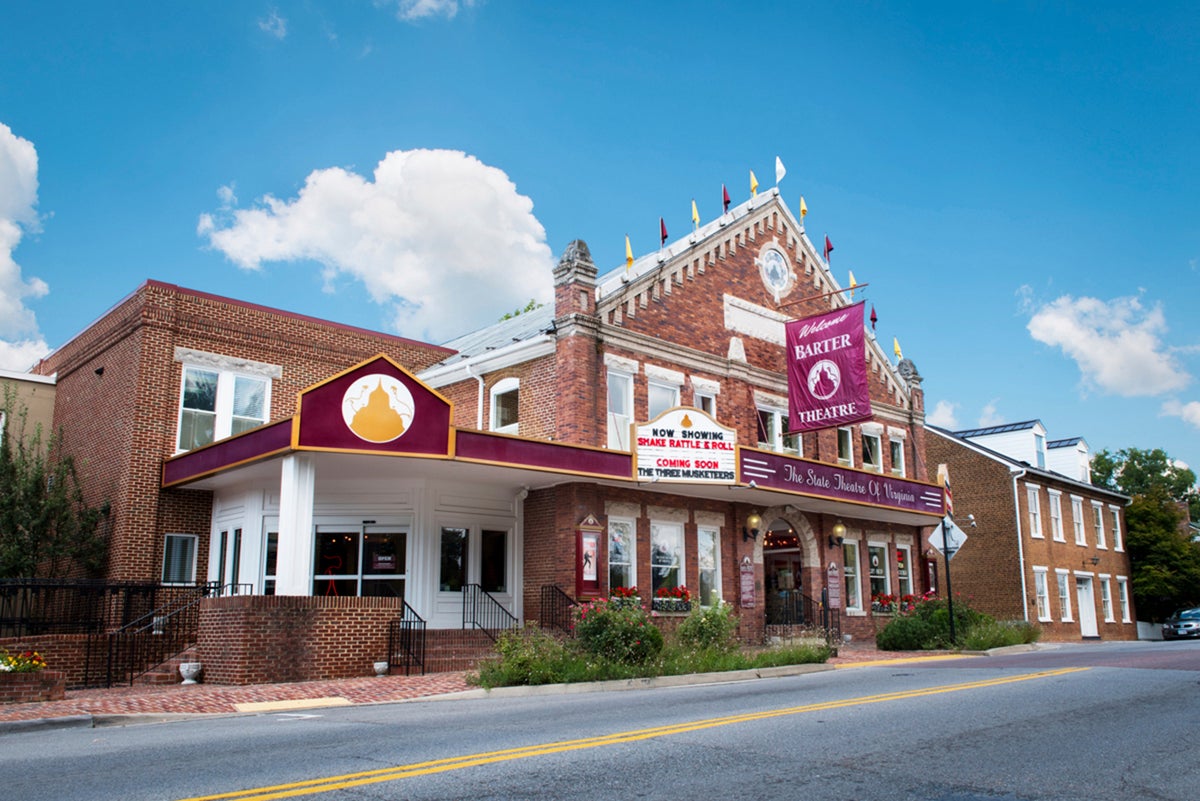
Everyone who enters Barter Theatre in southwestern Virginia is met and welcomed by Katy Brown, the producing artistic director.
It's a simple touch but a telling one for the 90-year-old theater in Abingdon that has forged a very human connection with its 8,000 residents. Barter Theatre is not just a theater; it's their theater.
“You can feel the ownership from the people that are here,” Brown says. “Really being a part of your community in that way is vital to the future of regional theater.”
Barter — a scrappy venue with roots in the Depression when patrons bartered goods for seats — may offer a roadmap as regional theaters struggle to reconnect with lagging post-pandemic audiences.
Lessons from other regional theaters — like embracing digital ways to connect, hosting events like LGBTQ Nights, rethinking the traditional calendar and even re-configuring theater lobbies — could help.
“The theater companies that are succeeding have taken the time during COVID to ask themselves how they stay relevant once they reopen,” said Joshua Borenstein, who leads the arts consulting nonprofit Odyssey Associates and lectures on theater management at Yale. “It’s going to take a lot of creativity and a lot of risk.”
Across the country, nonprofit theaters are suffering. Chicago’s Lookingglass Theatre has announced a yearlong pause in new productions and laid off half its staff. The Mark Taper Forum in Los Angeles has also halted productions for the rest of the 2023-24 season, and the influential Steppenwolf Theatre is shedding staff as its subscription base lags. New York's Public Theater has put its highly influential Under the Radar Festival on hold.
Some theaters have simply closed for good, like Triad Stage in North Carolina, Southern Repertory Theatre in New Orleans and New Ohio Theatre in New York. They all have been struggling with reduced donations and severely depressed ticket sales. Even Broadway isn't immune, with last season getting back 83% of its audience.
Data collected by Theatre Communications Group shows a sharp increase in the number of theaters' projected budget deficits: In fiscal year 2021, just 10% of theatres projected deficits, for fiscal year 2023 that number is 60%. Inflation isn't helping, pushing up costs for labor and materials.
While other sectors of the arts have rebounded, the worry is that theater audiences have changed their behavior, now seeming to prefer streaming nightly entertainment from the couch.
“None of us in drama school ever went to class and said, ‘How do you survive a global pandemic?’” said Chad Bauman, executive director of the Milwaukee Repertory Theater. “It’s truly uncharted waters that we’re in.”
Barter Theatre never let that bond break. As the pandemic took hold, it took over an unused drive-in movie theater, built a stage and was among the first theaters in the nation to invite back audiences, quarantining in their cars.
“People would stand out next to their cars and weep because they had somewhere to be,” says Brown. “People didn’t get out of the habit.”
Barter Theatre kept its sponsors and reports 80% recovery of its pre-pandemic subscription numbers. Single tickets purchases have roared back and group tickets, though slowly recovering, have rebounded more than expected.
“Our survival was very, very important to local businesses. So I think that’s been a big part of the support as well. We bring over 100,000 people to a town of 8,000 every year. So the restaurants needed us open, the hotels, the bed and breakfasts — they needed us open,” says Brown.
If there is a secret sauce for regional theaters, Barter Theatre may have it. It has woven itself into the community, with an annual Appalachian Festival of Plays and Playwrights and a program creating Black-themed plays and monologues. It has a resident company of actors who sink roots in the community, and the theater regularly asks its audience for their input.
“They are a part of creating the work and seeing themselves reflected in a way that feels true,” says Brown. “If you’re just bringing them something they can see anywhere, then that’s probably what they’re going to do.”
More lessons can be learned some 340 miles east in Virginia, at Signature Theatre in Arlington, which long before the pandemic had invested in staff, partnerships and equipment for a digital future. It offers a monthly streaming interview program, new online play readings and digital previews of upcoming shows for subscribers.
“We wanted our content online to be just as engaging as our content in the theaters,” said Maggie Boland, the managing director. “We didn’t realize it, but we were preparing for the pandemic in some ways without knowing that’s what we were doing.”
The theater is about 30% below where it was before the pandemic in terms of subscribers, but there’s a new audience mix. In just the past year, half the patrons indicated they'd never been to Signature before, perhaps lured by lauded productions of big shows like “Rent” and “The Color Purple.”
“Theater in this moment, now more than ever, has to be an event. There has to be a reason that people want to leave their Netflix to come to the theater,” said Artistic Director Matthew Gardiner. “We are producing these major musicals in this tiny theater that become events that are unmissable.”
Both Signature leaders say they are trying to adjust to a new post-pandemic era by tinkering with how they build the season — letting some shows run longer, for instance. Borenstein is seeing that as well: “People are looking for more flexible producing models.”
Milwaukee Repertory Theater pushed hard to open its doors as soon as it could after the pandemic, kept 90% of its staff and reopened with a bang with the epically big musical “Titanic,” with 34 actors.
“We knew that the longer we stay closed, the more likely our audiences would quite frankly forget about us. They would get out of that habit of going to the theater. They would find other means of entertainment,” said Bauman.
Theaters might also be faring differently due to how quickly workers returned to a five-day office schedule, with some doing better if they can lure more patrons already dressed and downtown after work. Bauman, who previously helped lead Arena Stage in Washington, DC, suspects theaters in the Midwest and South may be faring better than those on the coasts because of their more robust return-to-office policies..
“The field is facing some unprecedented challenges," he said. "But there is a light at the end of the tunnel because many of us are doing quite well. I do not believe that the theater field is in a freefall. I am optimistic about the future.”
Successful theaters are also inviting audience members who may not have considered live theater by holding affinity nights for gay or Asian community members and special shows for the neurodiverse or deaf.
“I think emphasizing and wrapping around programs to punch up the social components of going to the theater have been helpful for a lot of organizations because that’s the one advantage theater has over streaming,” said Borenstein.
TheatreSquared in Fayetteville, Arkansas, has made itself a draw no matter what's on stage. Its gorgeous, 50,000-square-foot new home combines two theaters, an open-all-day bar and café and community spaces. Some 16,000 people came through without a theater ticket last year.
“Not only are the doors open all day, you don’t have to have paid money to walk through them,” says former executive director Martin Miller, who this summer began leading the McCarter Theatre Center in Princeton, New Jersey.
“It makes the case that we are custodians of a public asset, not guardians. We are not the gatekeepers. We’re the ones holding the doors open.”
Miller says theaters have to find a way for the community to care deeply about their regional theater. That means being welcoming, whether it's an open door or an arm outstretched.
“This is not a world of if you build it, they will come," he said. "This is a world of constant renewed invitation and a sense of gratitude that extends in both directions.”







